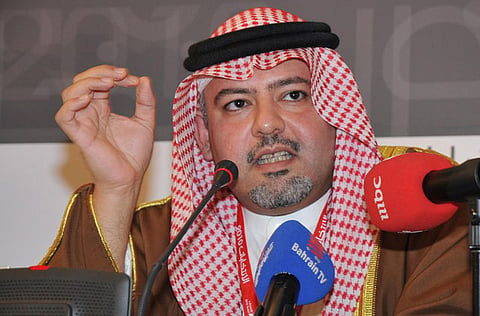Bahrain insists on regulating foreign contacts
Law on foreign contacts exist in advanced countries — minister

Manama: A decision to regulate contacts between Bahraini political societies and foreign diplomats and delegates does not include public meetings, such as evening gatherings at majlises in Ramadan, the month of fasting, the justice minister has said.
Under a decision announced by the justice ministry last month, all contacts between Bahraini political societies and diplomatic missions and consulates in Bahrain or foreign organisations and government institutions or representatives of foreign governments must be done in coordination with the foreign ministry.
“The Ramadan majlis meetings are public and open, which is in line with the conditions set by the decision,” Shaikh Khalid Bin Ali Al Khalifa said. “The majlises are open social gatherings and everything that is said or done there is obvious for everyone. The decision refers to contacts with foreigners without the knowledge of the concerned authorities,” he told the media at a press conference on Wednesday.
Under the decision, the contacts should be held in the presence of a representative from the foreign ministry or any other party the ministry selects.
The decision, an amendment to a 2004 ministry of justice and Islamic affairs decision on communications between local political societies and foreign political parties or organisations, required the political societies to inform the Ministry of Justice and Islamic Affairs on their coordination with the ministry of foreign affairs at least three working days before the day of the contact.
However, the opposition societies said that the decision aimed to restrict their political manoeuvres and limit their open contacts.
But, Shaikh Khalid at the press conference said that the decision, issued in response to a demand by the parliament, was in line with the 2005 political societies law that stipulated that all political societies in the kingdom had to go public with their activities.
“We thus wish to emphasise that regulating the relationship between local political societies and the representatives of the government on the one hand, and foreign institutions and organisations on the other hand, is the adopted procedure to ensure transparency of political activities,” Shaikh Khalid said.
“The law also required all societies not to interfere in the domestic affairs of other countries and the non-interference of other countries in our internal affairs. Bahrain does believe in the rights of political societies to have political contacts within the confines of the law and transparency,” he said.
The minister said that laws regulating contacts between local parties and foreign political entities existed in several advanced countries, including in Europe where the foreign ministry oversees the situation.
Shaikh Khalid said that Bahrain’s laws allowed the formation of political parties and to engage in full party activities.
“They are referred to as societies because that is the term used in the constitution,” he said. “What is really significant is not the name, but rather the genuine political practices within the confines of the laws and constitution. Real democracy practices mean that societies should not base their activities on sectarianism,” he said.



